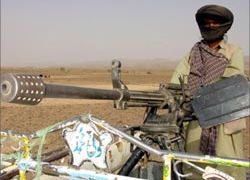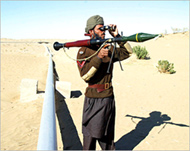Baluch fighters surrender in Pakistan
Hundreds of tribesmen fighting for greater independence for Baluchistan have surrendered to Pakistan’s army and begun disarming, according to a government spokesman.

An estimated 600 fighters, led by three commanders, agreed to lay down their weapons after talks with Shoaib Nausherwani, Baluchistan’s minister for internal affairs, in Dera Bugti district on Saturday.
The fighters were members of one of several groups in south-west Pakistan who are fighting for increased autonomy for the Baluch people, one of the country’s several ethnic minorites.
In the town of Baker, 400km (250 miles) northeast of Quetta, the rebels began surrendering AK-47 rifles, rocket-launchers and mortars on Sunday, government officials said.
Representatives of the regional Baluchi Government said the tribesmen’s decision to stop fighting would hasten the end of the revolt led by tribal chieftain Nawab Akbar Bugti.
On the same day, however, a bomb wounded nine people in a town close to Baker.
The explosion was a reminder that both the shadowy Baluch Liberation Army and the leaders of the Marri and Mengal tribes continue to attack the federal government and demand greater regional autonomy.
High stakes
 |
|
Baluch nationalists have been fighting the government for long |
The province of Baluchistan is one of the largest and poorest in Pakistan. But it also contains huge mineral wealth and the country’s largest reserves of natural gas.
At present revenue from the region’s gas fields and from other natural resources goes to Karachi and is then spent nationally.
But tribesmen fighting for greater autonomy for Baluchistan want a greater share of this wealth to go to local people.
Baluchi fighters often attack government buildings and military bases. They have also blown up gas installations, rail links and electricity pylons as part of their campaign for more independence and greater political representation.
The Baluchistan region has rarely been completely peaceful. Baluch nationalists fought a full-blooded insurgency in the 1970s, and low-level violence has continued ever since.
The conflict heated up again last December after militants fired rockets at a Baluch town during a visit by President Pervez Musharraf. The army responded by using helicopter gunships to attack rebel areas.
Disappearances
 |
|
A Pakistani para-military soldier guards a natural gas pipeline |
Pakistani media has reported that many leading Baluch personalities and activists have disappeared in recent months after being detained by the security services.
Shahid Bugti, an aide to Nawab Bugti and a member of the senate in Islamabad, said that authorities have put him under house arrest in Quetta.
“A large number of police surrounded my house early Sunday and I was told that I couldn’t go out,” he said.
Bugti accused the government of not listening to the Baluchs.
“Just as in the past, they see Baluchistan’s problems with closed minds,” he said. “They don’t want to understand our problems.”